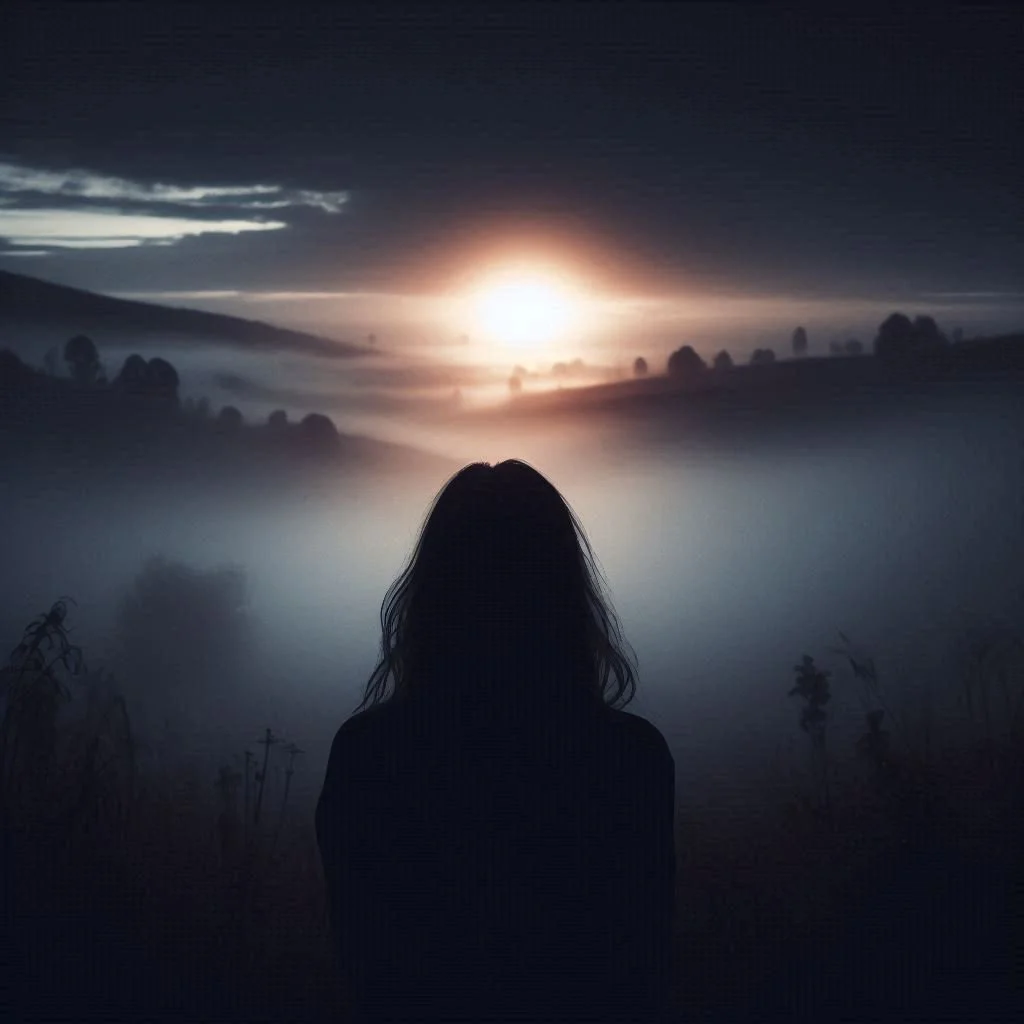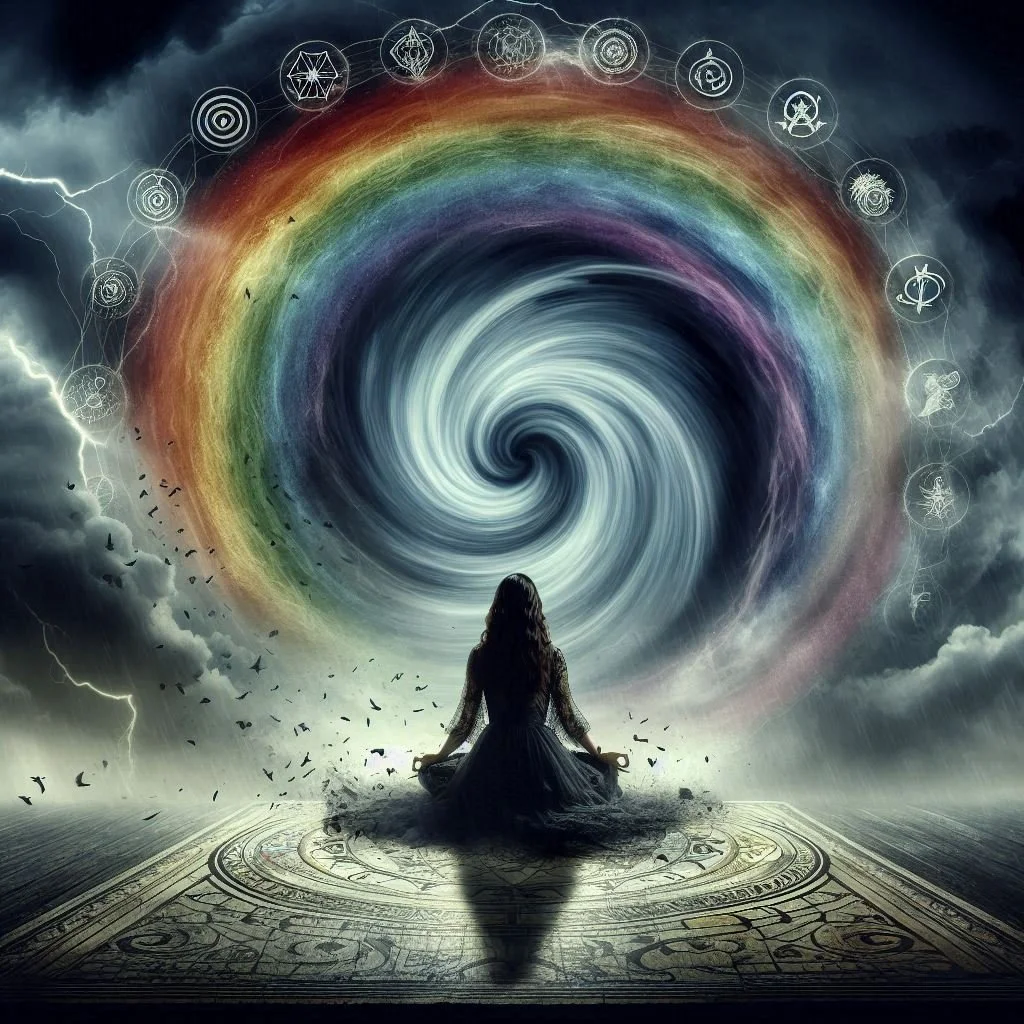Spiritual Courage
When we’re suffering, or when we witness the suffering of another or an entire group, there is often some part of us that wants to turn away. It’s a part that wants to avoid the possible contagion of hurt; a part of us that biologically detects danger in exploring the psycho-spiritual hell realms; and a part of us that seeks safety or refuge in those places of temporary relief. We can all relate to that impulse — the impulse to hide from the places that are uncertain, turbulent, or frightening — from the places that would demand a change, a relinquishment or… a leap.
There is a connection between the courage it takes to be there for our own suffering and the courage to be there for someone else’s. Long ago in my 20s, while trying to be the “hero” for others, I realized that my effectiveness was undeniably (and at times, embarrassingly) limited. What I could not bear in myself I had trouble holding for and with others, and I eventually understood that self-realization is a profound act of love for the world. I now see that compassion that emerges from the depths of inner knowing is remarkably formidable. In encountering our own dynamism, compassion becomes equally multi-valent, creatively responding to life’s seemingly infinite permutations of suffering.
But it takes courage to turn towards our own suffering. Acknowledging that fact can actually ennoble the journey. When we feel shakey or humbled, or when we’ve encountered previously unconscious threads of rage or despair, we can know that our seeing is a sign that spiritual courage has arisen from within, helping us to not only withstand what we see - but understand it as well. We are willing to become changed by our suffering, and this is a potent force for awakening.
Still, the spiritual courage it takes to tread in the waters of our depths seems mysterious and elusive at times. We’re expecting the absence of fear, or the immediacy of contentment. When I visit with hospice patients who are upset and frightened, but nonetheless consciously receiving the unfolding reality, I often ask them if they can appreciate the spiritual courage they are exhibiting, and just as often, they say “no.” They’re expecting that the presence of courage would mean not feeling any of those emotions that are typically slated as “negative.” My own belief is that courage doesn’t feel any particular way: sometimes we feel shakey, pissed, or ashamed even as we’re exhibiting a beautiful boldness to receive life. Spiritual courage is not any particular feeling: it is a way of turning towards reality. My hope is that, in naming some of the aspects of spiritual courage, it might embolden us to recognize the sign posts that we’re on the right track.
The Courage to Look
Spiritual courage often starts with a willingness to look at our own suffering. It’s the part of you that insists on starting a meditation practice to examine your experience; or the part of you that buys a journal to explore your day-time feelings and nighttime dreams; or the part of you that reaches out to a friend, therapist, or spiritual advisor for some guidance or support. Part of the courage to look, therefore, is turning towards a practice or a container capable of supporting your personal examination of suffering. Doing so is a sign that we are willing to turn inwards, to look at our own minds and hearts, even if they’re aching.
Just as often, the courage to look also involves a turning away from something else. When the itchiness of restlessness, fear, or anger starts bubbling up in consciousness, it’s so easy to find a way to ignore it through the inertia of our habits. We distract ourselves through TV, a scroll through our phones, or anything else that might drown-out the signs that reality is shifting beneath our feet (ah, to be human!) We might rationalize that we have “so much work to do,” staying extra-busy at our jobs, and therefore giving our distraction a nice, shiny, conventional purpose. And yet, the courage to look at suffering means dropping all of that regularly. Meditation teacher Chögyam Trungpa Rinpoche once said that, “Busyness is the highest form of laziness.” That’s a rather sharp way of saying that mindlessly bobbing down the fast-moving river of our habitual distractions, in the short term, feels so much easier than turning towards the current of our pain. It is a sign of courage when we instead stop and turn towards what’s flowing in us — especially when the “water” is choppy.
The Courage to Go Deeper and Not Turn Back
Sage and meditation adept Sri Nisargadatta Maharaj once said
“The first steps of self-discovery are not at all pleasant, for what one sees is not a happy sight. One needs all the courage to go further…”
The Tibetans have a crasser version of such an elegant pointing out. Their adage goes something like this: when you start to wash away dried poop from the sidewalk with water, at first it smells worse!
Similarly, it’s very common that when we start to look at our experience, we often feel worse: overwhelmed; scared by the intensity of sensation; perturbed by generally feeling “out of control;” or disturbed the darkness of the hollowness we feel. As Christian mystic and poet John O’Donahue says: “At first your thinking will darken, and sadness take over like listless weather. The flow of unwept tears will frighten you.” Buddhist nun Pema Chödron has shared similar sentiments, stating, “We often talk about how terrible samsara (habitual suffering) is, but not often about how terrible getting out of samsara can be… and the experience can be excruciating.”
But before you run from this blogpost and hide under the covers, consider that if you experience these initial stages of greater intensity — it’s a sign that you already have the courage to go deeper and not turn back. It’s a GOOD sign! You are starting to not only look at your experience, but see and understand it as well.
Here, there are countless modalities and practices that can help us not turn back. Loving kindness practices, visualization, bodywork, insight meditation, and even the rich well-spring of mythopoetic story can help us continue the trek in unfamiliar territory. When I first started seriously meditating, there was a significant period of time where I felt like it took all my courage to not give up. I was in a dark-night-of-the-soul period of my life, where I felt like I was being spiritually dismembered and turned inside-out. Yes, I was willing to explore my grief, the construction of my panic attacks, and my fear; but I was simultaneously being affected by these experiences. I found refuge in many teachings, but one source surprised me…
I encountered an ancient Sumerian myth about the Goddess Inanna who descends to the underworld to encounter her “dark sister,” Ereshkigal (for a great analysis on this myth, I recommend Descent to the Goddess, by Sylvia Brinton Perrera). Having a name and description of “Ereshkigal” (the dark intensity I was experiencing), and an understanding of Inanna’s path of descent to her, helped me “mytho-poeticize” the psycho-spiritual tornado I was experiencing. The myth brought vital instructions to life: how to notice Ereshkigal when she has arisen, how to express reverence to her, and what tasks needed to completed or abandoned to allow for her transformative work. Since then, I see mythology as an archetypal goldmine for helping us navigate a variety of experiences, including the most disturbing. The courage to go further, therefore, is not measured by our individual strength or will, but by our surrender to emergent forms of wisdom… even if initially new or “bizarre.”
The other aspect of the courage to go deeper is being willing to lean on guides: human, live, flesh-and-blood guides. Preferably someone who has been to hell and back, and has learned that “hell” is not the enemy but rather: the portal. In my depths, I was so fortunate to have encountered authors, intuitives, Buddhist lamas, and compassionate friends who could walk with me, pointing out and normalizing the terrain, while letting me know where to watch my footing. The courage to not turn back means realizing: there are resources and we’re not alone.
The Courage to Let Go
If courage is not a particular feeling, but a way we relate to reality, at some point, it becomes clear that spiritual courage involves loosening our grip on life. We have to let the waters of being alive flow. This means being willing to accept dissolution… that things change. This acceptance is the opposite of passivity, for it is what enables a genuinely, fresh responsiveness to life’s infinitely dynamic display. We’re willing to bob up and down in the births and deaths of happenings, and nonetheless play our authentic hand, even if we lose.
The courage to let go into life’s interdependent flow ultimately makes life vibrant and meaningful. We are exhibiting this kind of courage when we realize that uncertainty is inescapable; when change becomes intriguing, even when it’s hard; and when we relinquish our grip on the deadness of certainty. We are exhibiting this courage when we rest when we need to rest; when we leap when we need to leap. When we breathe. Feel. Look. And dive in all over again.
Spiritual courage is nothing we need to manufacture. It is the well-water that we discover when we dig deep. Ditch Digger: keep going! I’m doing the same right next to you.




